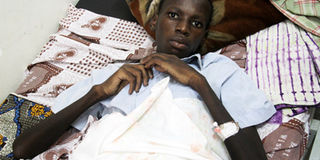Typhoid patient needs shs10m

Emma Okoth lies on his bed at Nsambya hospital. Photo by Abubaker Lubowa
Emma Okoth, 17, lies helpless on a Nsambya hospital bed. He can hardly sit up due to the pain in his lower abdomen. End stage typhoid perforated his intestines. He needs about Shs10,273,200 to complete treatment and clear the accumulated hospital bill.
Okoth was discharged two weeks ago and though he should have left the hospital, he remains there because his parents are unable to raise the money for the accumulated medical bills.
Okoth owes the hospital Shs1, 470,200, and will need another Shs8,803,000 for further treatment and rehabilitation.
Unfortunately, he is unable to pay even half of the Shs1, 470,200 he owes the hospital.
Okoth’s doctor, Dr Moses Magezi, a urologist at Nsambya hospital, confirms that Okoth was discharged.
“He was discharged and asked to come for review every two weeks. He is now improving nutrition-wise but needs a high protein diet and fats so that he improves and gets enough nutrients to stand surgical stress. We need to operate him and put back the intestines. He was discharged to benefit from home rehabilitation,” explains Dr Magezi.
What the patient requires
Dr Magezi says the review will help assess Okoth’s nutritional improvement and gauge if he is fit for surgery.
“We will weigh, check his blood sugar, haemoglobin, check if the infection is gone, and nutritional albumins which answer for wound healing. If you work on him [operate] when he is not nutritionally well, the wound will not heal. The review will go on until he is fit for surgery.”
Although he was discharged, the doctor says Okoth still receives painkillers at no extra cost.
According to Justine Uwimbabazi, the credit controller of Nsambya hospital, Okoth cannot start review and get further treatment unless he clears the pending bill (Shs1,470,200). She says the additional Shs8,803,000 is an estimation of how much he will need for review, surgery, drugs, laboratory tests, radiology, nutritional rehabilitation, colostomy bags, among other requirements.
Just like Dr Magezi, she says it is hard to tell the exact amount he will need for further treatment, or the kind of attention he will require at this stage. This can only be gauged during review visits, and also determined by his recovery ability.
Uwimbabazi says he might need more than Shs8.8m for further treatment and management of his condition or even less, depending on how long he takes to recover and his state at each review.
Dr Magezi says sometimes the infection takes six weeks or even three months. Everything depends on how fast Okoth’s body will recuperate, and of course the financial obligation that comes with it.
The doctor has recommended parenteral feeds, which can be bought from any pharmacy to help with nutritional rehabilitation, and continued use of colostomy bags until the intestines are rejoined.
Genesis of the problem
In early-April, Okoth developed intensive stomach pain, vomiting and constipation. He was taken to a nearby clinic in Mbuya but he says he advised to go to a hospital. He went to Naguru hospital where he was admitted for close to two weeks.
Okoth says the medical personnel at Naguru told him he was suffering from typhoid but said they could not manage his condition and hence referred him to Mulago hospital.
At Mulago, he was diagnosed with second degree typhoid and operated on.
Okoth however says that after the operation, the medical personnel left him unstitched for a week. “The wound was open and I could see a pipe in for a week,” he says.
On May 11, he was discharged but his wound was still fresh and he could not sit or walk on his own. His parents hired a nurse to attend to him at home but his condition deteriorated.
They then rushed him to Nsambya hospital where a second operation was performed.
Admitting that he is better than he came to Nsambya hospital, Okoth says he is not yet fine.
He still uses a colostomy bag because typhoid left holes in his intestines and so his faecal matter had to be channeled to the bag. His father, Charles Oyuk says he uses three colostomy bags in a day.
He appeals to the public to help him clear the hospital bill and get further medical attention.
How you can help
To help Emma Okoth kindly send in your contributions to his father Charles Oyuk on 0752-959839.




